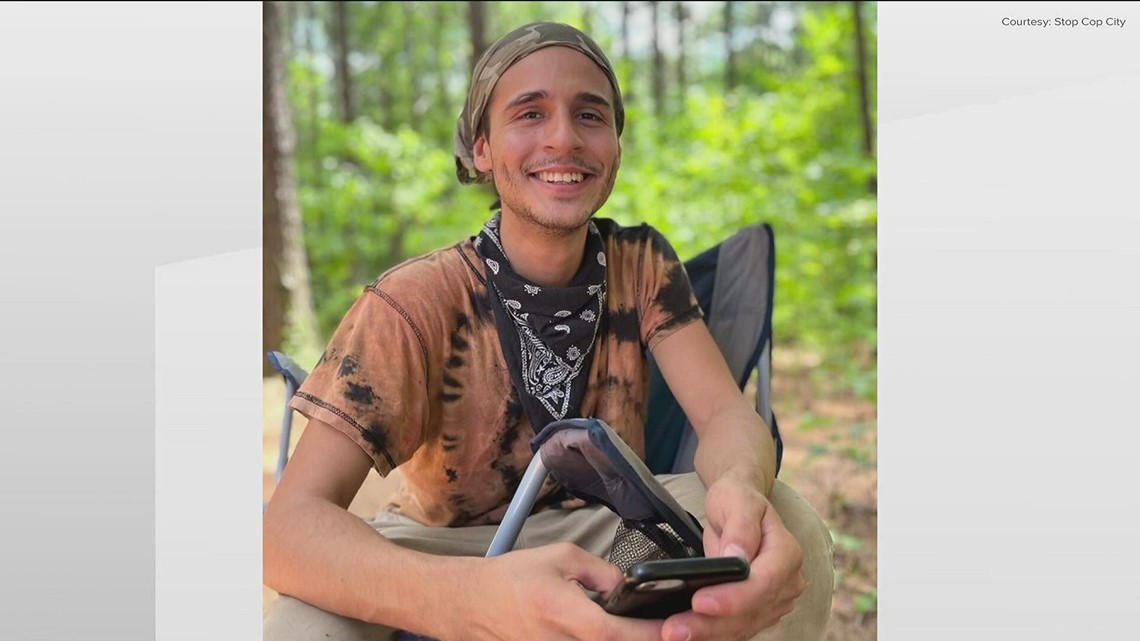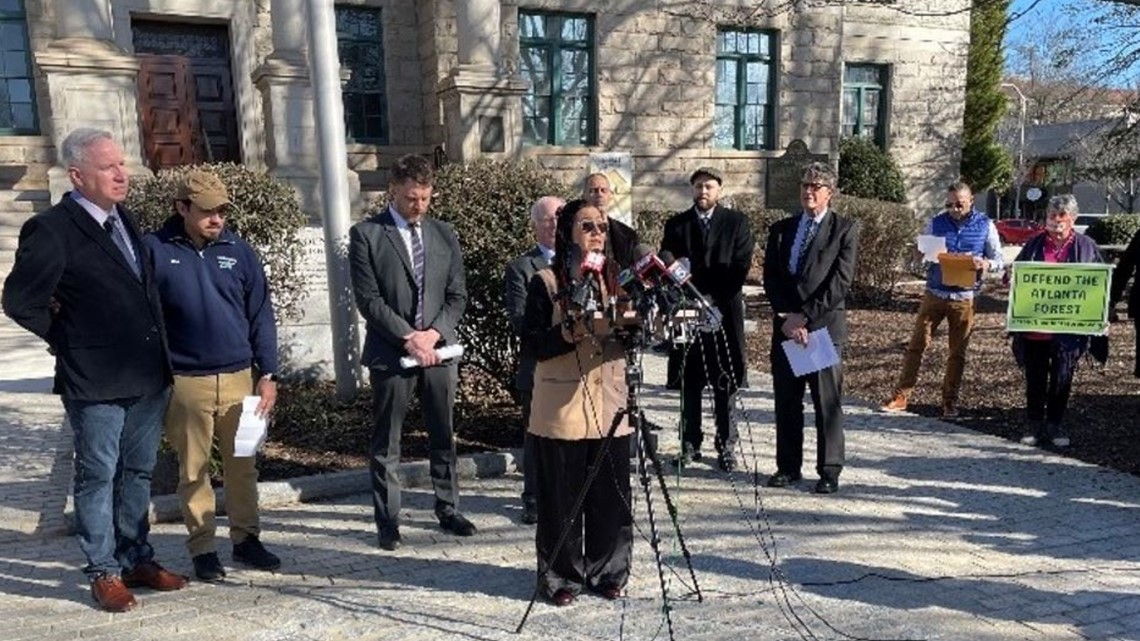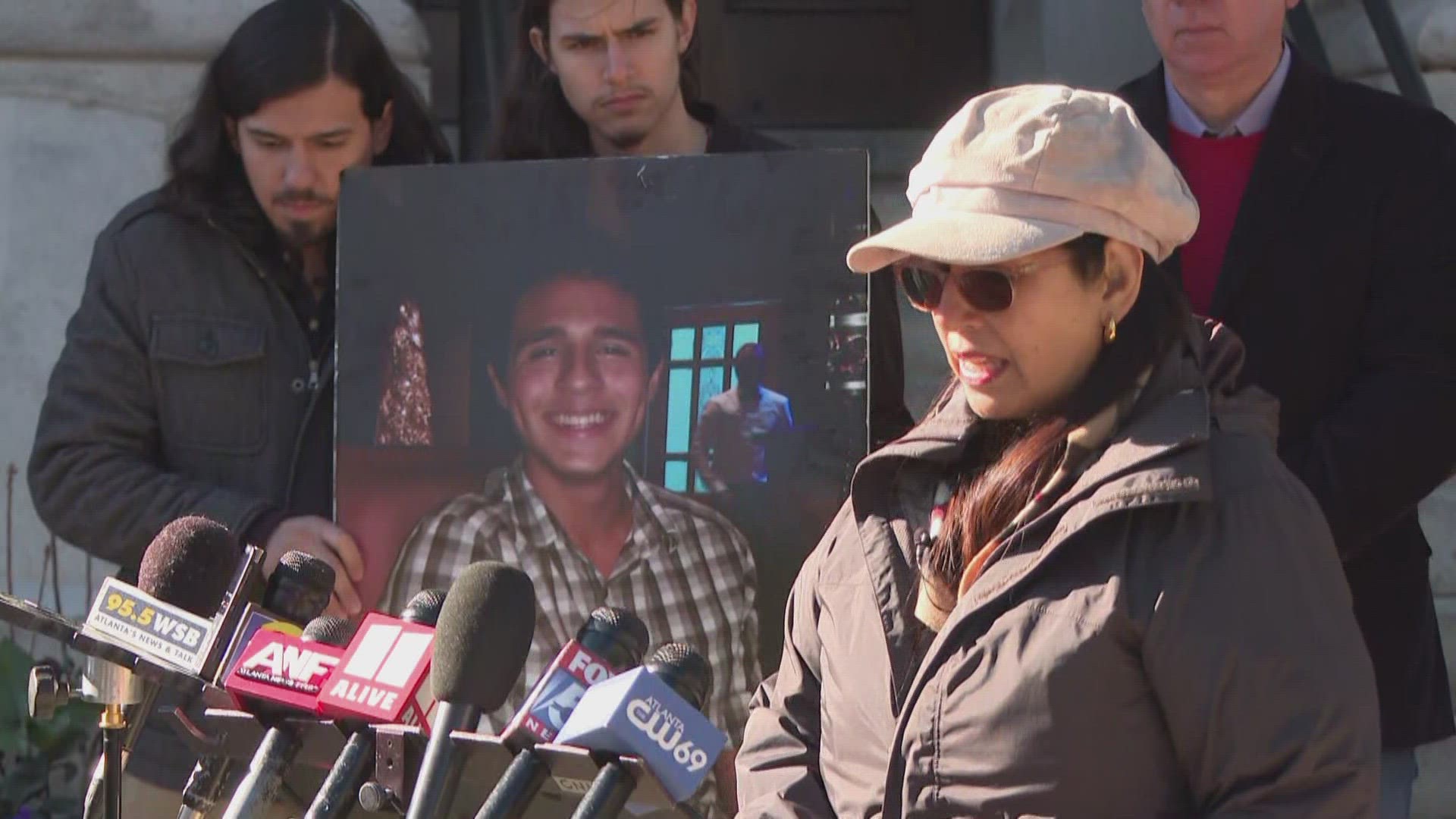ATLANTA — Attorneys and the family of Manuel Esteban Paez Teran spoke publicly Monday, offering an independent autopsy they said was done by the state's former chief medical examiner showing Paez Teran's hands were raised while the activist was shot to death by law enforcement officers.
The family has filed a lawsuit for access to records on Paez Teran's death after the GBI prevented the City of Atlanta from providing additional audio and video evidence related to Paez Teran's shooting, citing the ongoing investigation, according to the attorneys.
Paez Teran was shot at the future site of the Atlanta Public Safety Training Center — called "Cop City" by those who oppose the development — on Jan. 18.
"I want answers for my child's homicide, I am asking for answers for my child's homicide," Paez Teran's mother, Belkis, said Monday.
This autopsy showed that Paez Teran was facing "multiple individuals who were firing weapons." There was no obvious evidence of close-range firing.
Both of Paez Teran's palms show exit wounds, and the activist was "most probably in a seated position, cross-legged when killed." Paez Teran's palms were facing towards their upper body, and the protestor was able to raise their arms during the course of being shot, according to the autopsy.
However, the autopsy report deemed it "impossible" to determine if Paez Teran had been holding a firearm before being shot or while being shot.
"Manuel was looking death in the face, hands raised, when killed," Spears said.
Paez Teran's brother, Daniel, also spoke about backlash to the family and how he feels "hated" in Atlanta, reading out hateful messages he had received.
"My voice values less for being out of state, despite my 10 years of military service?" Daniel said. "It's ironic I'm trusted with nuclear secrets, but I'm not trusted with the evidence of my sibling's murder."
The 26-year-old's father Joel Paez also spoke, calling his child "a hero."
The GBI, in a statement Friday, said, "All the facts, to include any information brought forward by the family’s attorney, will be assessed... The GBI cannot and will not attempt to sway public opinion in this case but will continue to be led by the facts and truth. We understand the extreme emotion that this has caused Teran’s family and will continue to investigate as comprehensively as possible."
Decatur-based attorneys Brian Spears and Jeff Filipovits Monday discussed the autopsy and the lawsuit filed against the City of Atlanta under the Georgia Open Records Act.
RELATED: What is 'Cop City'? Explaining the controversy around a future police training center in Atlanta
Spears and Filipovits highlighted how the second autopsy was performed by Dr. Kris Sperry, who himself was formerly a top official at the GBI.
Sperry retired from the GBI several years ago amid scrutiny on his billing practices and work as a private consultant for defense attorneys, which has previously come up in murder trials where he's testified.
The attorneys also criticized the GBI for what they characterized as the selective public release of evidence to further the official narrative in the death of Paez Teran, which is that the activist shot a Georgia State Patrol trooper before being killed in return fire.
Bodycam released by Atlanta Police officers - who were not at the scene of the shooting, but operating nearby - has further been the focus of the counternarrative offered by protesters.
In particular, an Atlanta Police officer saying to himself, "You f***** your own officer up," has been held up by the protest movement as evidence of their counternarrative - that the trooper was shot by friendly fire.
Atlanta Police, for their part, have said they have "found no evidence" their officers had any particular insight into what had happened as they operated away from the actual shooting scene.
"I understand the need for integrity in an investigation, understand not wanting witnesses to hear what other witnesses have said or see all the videos before they're asked questions. But once you release what the official narrative is, the investigation is tainted already," Filipovits said. "Now they have had plenty of time, and we have nothing."
The attorneys called for the GBI to meet with Paez Teran's family and release of "all information" related to their investigation of the shootings.
"The actions of the GBI to prevent inappropriate release of evidence are solely intended to preserve the integrity of the investigation and to ensure the facts of the incident are not tainted," the bureau said Friday.
The attorneys also decried the domestic terrorism charges that have been levied against members of the protest movement arrested in subsequent operations, as elements of protest marches and gatherings have in recent months resulted in some property damage, including fires set to police vehicles in Downtown Atlanta and construction equipment at the build site for the training center.
"People are sitting in the DeKalb County Jail right now who have no factual basis for the charges against them, at least none that were articulated," Filipovits said. "None of the people have an allegation that they threw a Molotov cocktail, that they lit construction equipment on fire, none of the allegations we heard were specific to any one person."
Last week all but one of 23 people taken into custody in recent operations were denied bond by a DeKalb judge. The lone person granted bond is a lawyer with the Southern Poverty Law Center.




It is an 85-acre, $90 million facility that was approved by the Atlanta City Council in 2021. It would be built on city-owned land in accordance with a lease agreement between the city and the Atlanta Police Foundation, a private nonprofit that supports the Atlanta Police Department..
It is to be built on a portion of the South River Forest area - protesters refer to it as the Weelaunee Forest, for the Native American name it was once known by - on top of the Old Atlanta Prison Farm complex.
It lies within south DeKalb County, roughly bounded by Intrenchment Creek to the east, Key Road to the north and Constitution Road to the south.
Why is the Atlanta Public Safety Training Center controversial?
The law enforcement community has argued the training facility would be a crucial component in stabilizing the police force, aiding in recruitment and retention after low morale and departures following the racial and criminal justice protests of 2020.
They have also said it would improve training and community ties, framing it as an answer to police reform demands stemming from the 2020 protests to eliminate contentious policing practices and reduce tensions between the police department and the public.
It is supported by several city and state political leaders, including Mayor Andre Dickens and Gov. Brian Kemp.
The protesters have opposed the facility on environmental and historical grounds, saying it would decimate one of the largest preserved forest areas in the city and desecrate historically Native American land of the Muscogee Creek people, who once lived in the woods and called it the Weelaunee Forest before being displaced by white settlers in the early 19th century.
They also oppose it on the grounds that the land was once the site of the Old Prison Farm, a jail complex that was billed during its operation in the mid-20th Century as an "Honor Farm" where prisoners farmed the land as a "dignified means of imprisonment," a practice which has since been scrutinized for its profit generation and exploitation of unpaid labor.
Community groups in the area have also told 11Alive they are against it because it would place a heavy police presence within a predominantly Black area, worrying about environmental and qualitive (such as noise and light pollution) impacts to the surrounding neighborhoods and questioning why it can't be built in wealthier sections of the city such as Buckhead.

